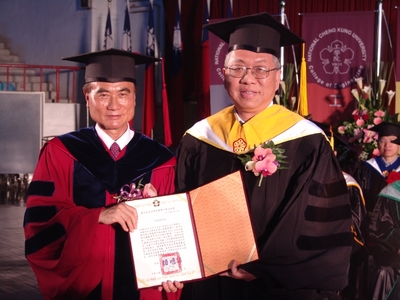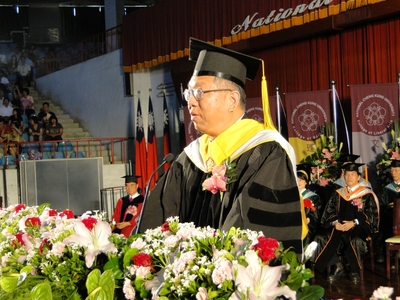Notable Mathematician Shing-Tung Yau Received NCKU Honorary Doctorate Degree on June 5th


Tainan, Taiwan, June 5th, 2010
The Notable Mathematician Shing-Tung Yau, one of the 1982 winners of the Fields Medal that is often described as the "Nobel Prize of Mathematics", has received Honorary Doctorate degree from President Michael Ming-Chiao Lai of National Cheng Kung University (NCKU), Taiwan, on June 5th.
National Cheng Kung University has given Honorary Doctorate degrees to many internationally renowned scholars and masters, including the 1986 Nobel Laureate in Chemistry Yuan-Tseh Lee, the 2004 Nobel Laureate in Chemistry Aaron Ciechanover and Britton Chance as a member of the USA National Academy of Sciences.
President Michael Ming-Chiao Lai of National Cheng Kung University praised Dr. Shing-Tung Yau to be one of the most contemporary influential mathematicians in the world, “Dr. Shing-Tung Yau has published hundreds of academic papers and masterpieces, solved numerous renowned problems and created many innovative research fields. Dr. Yau’s research work has led the development of differential geometry and other important areas of mathematics in the past 30 years and expanded people’s understanding of the applications of partial differential equations on differential geometry, influencing Topology, Algebraic Geometry, Representation Theory and General Relativity. NCKU is proud of Fellow Shing-Tung Yau and we expect Dr. Yau to make frequent visits to NCKU to pass down his knowledge and experience to our students.”
Upon receiving his NCKU Honorary Degree of Doctor, Dr. Shing-Tung Yau expressed, “I’m honored to stand here and accept the Honorary Doctorate degree from National Cheng Kung University. I’ve heard so much about NCKU. Many renowned scholars have graduated from this university. I’m also grateful for President Michael Ming-Chiao Lai, Senior Executive Vice-President Da-Hsuan Feng and my colleagues from the Department of Mathematics who have taken care of my family. As a result, I had more opportunities to get to know the beautiful campus of NCKU.”
Dr. Yau said, “The medical and engineering achievements of National Cheng Kung University have made major contributions on human society. This is every scholar’s dream to make industrial, scientific or humanistic contribution to the world with the knowledge that we’ve learned.”
Dr. Yau also mentioned, “We have to learn from a broader perspective, thus we can achieve academic independence and reach a supreme academic realm without the domination of external forces. Historically, major engineering breakthroughs often start with basic scientific breakthroughs, such as electromagnetism and the discovery of laser. Due to our curiosity, we begin with bizarre phenomenon that we wish to understand and eventually receive epoch-making results.”
Dr. Yau pointed out, “With the spirit of academic independence, we soon discovered that the application range of learning is unlimited. A scientist with originality has to cultivate deeper humane accomplishments. I encourage the graduating students today to become versatile talents and members of the team which contributes to the society. Good luck on your success.”
Dr. Shing-Tung Yau, born on April 4th, 1949, in Shantou, Guangdong Province, China, is a Chinese-American mathematician noted for his study and research on differential geometry.
He received his doctoral degree from University of California, Berkeley, in 1971. He is currently the Chair Professor of Harvard University, and he has taught at State University of New York at Stony Brook, Stanford University, Institute for Advanced Study and University of California, San Diego.
Dr. Yau is the Academician of Academic Sinica, a Member of American Academy of Arts and Sciences, a Fellow of American Association for the Advancement of Science, a Fellow of Society for Industrial and Applied Mathematics, a Fellow of American Physical Society, a Member of Boston Academy of Arts and Sciences, a Member of New York Academy of Science and a Fellow of American Mathematical Society.
He has received numerous awards including Oswald Veblen Prize in Geometry in 1981, Fields Medal in 1982, Veblen Prize in 1981, Crafoord Prize in 1994, National Medal of Science in 1997 and Wolf Prize in 2010.
Dr. Yau has made major contributions on both physics and mathematics and also lasting impacts on the fields of Topology, Algebraic Geometry, Representation Theory and General Relativity.
His major contributions include several work on conjectures, such as Calabi conjecture, positive mass conjecture and existence of black holes, Smith conjecture, Hermitian Yang-Mills connection and stable vector bundles, Frankel conjecture and Mirror conjecture, as well as new methods and concepts of gradient estimates and Harnack inequalities, uniformization of complex manifolds, harmonic maps and rigidity, minimal submanifolds, and also open problems in geometry, covering harmonic functions with controlled growth, rank rigidity of nonpositively curved manifolds, Kähler–Einstein metrics and stability of manifolds and Mirror symmetry.
The Notable Mathematician Shing-Tung Yau, one of the 1982 winners of the Fields Medal that is often described as the "Nobel Prize of Mathematics", has received Honorary Doctorate degree from President Michael Ming-Chiao Lai of National Cheng Kung University (NCKU), Taiwan, on June 5th.
National Cheng Kung University has given Honorary Doctorate degrees to many internationally renowned scholars and masters, including the 1986 Nobel Laureate in Chemistry Yuan-Tseh Lee, the 2004 Nobel Laureate in Chemistry Aaron Ciechanover and Britton Chance as a member of the USA National Academy of Sciences.
President Michael Ming-Chiao Lai of National Cheng Kung University praised Dr. Shing-Tung Yau to be one of the most contemporary influential mathematicians in the world, “Dr. Shing-Tung Yau has published hundreds of academic papers and masterpieces, solved numerous renowned problems and created many innovative research fields. Dr. Yau’s research work has led the development of differential geometry and other important areas of mathematics in the past 30 years and expanded people’s understanding of the applications of partial differential equations on differential geometry, influencing Topology, Algebraic Geometry, Representation Theory and General Relativity. NCKU is proud of Fellow Shing-Tung Yau and we expect Dr. Yau to make frequent visits to NCKU to pass down his knowledge and experience to our students.”
Upon receiving his NCKU Honorary Degree of Doctor, Dr. Shing-Tung Yau expressed, “I’m honored to stand here and accept the Honorary Doctorate degree from National Cheng Kung University. I’ve heard so much about NCKU. Many renowned scholars have graduated from this university. I’m also grateful for President Michael Ming-Chiao Lai, Senior Executive Vice-President Da-Hsuan Feng and my colleagues from the Department of Mathematics who have taken care of my family. As a result, I had more opportunities to get to know the beautiful campus of NCKU.”
Dr. Yau said, “The medical and engineering achievements of National Cheng Kung University have made major contributions on human society. This is every scholar’s dream to make industrial, scientific or humanistic contribution to the world with the knowledge that we’ve learned.”
Dr. Yau also mentioned, “We have to learn from a broader perspective, thus we can achieve academic independence and reach a supreme academic realm without the domination of external forces. Historically, major engineering breakthroughs often start with basic scientific breakthroughs, such as electromagnetism and the discovery of laser. Due to our curiosity, we begin with bizarre phenomenon that we wish to understand and eventually receive epoch-making results.”
Dr. Yau pointed out, “With the spirit of academic independence, we soon discovered that the application range of learning is unlimited. A scientist with originality has to cultivate deeper humane accomplishments. I encourage the graduating students today to become versatile talents and members of the team which contributes to the society. Good luck on your success.”
Dr. Shing-Tung Yau, born on April 4th, 1949, in Shantou, Guangdong Province, China, is a Chinese-American mathematician noted for his study and research on differential geometry.
He received his doctoral degree from University of California, Berkeley, in 1971. He is currently the Chair Professor of Harvard University, and he has taught at State University of New York at Stony Brook, Stanford University, Institute for Advanced Study and University of California, San Diego.
Dr. Yau is the Academician of Academic Sinica, a Member of American Academy of Arts and Sciences, a Fellow of American Association for the Advancement of Science, a Fellow of Society for Industrial and Applied Mathematics, a Fellow of American Physical Society, a Member of Boston Academy of Arts and Sciences, a Member of New York Academy of Science and a Fellow of American Mathematical Society.
He has received numerous awards including Oswald Veblen Prize in Geometry in 1981, Fields Medal in 1982, Veblen Prize in 1981, Crafoord Prize in 1994, National Medal of Science in 1997 and Wolf Prize in 2010.
Dr. Yau has made major contributions on both physics and mathematics and also lasting impacts on the fields of Topology, Algebraic Geometry, Representation Theory and General Relativity.
His major contributions include several work on conjectures, such as Calabi conjecture, positive mass conjecture and existence of black holes, Smith conjecture, Hermitian Yang-Mills connection and stable vector bundles, Frankel conjecture and Mirror conjecture, as well as new methods and concepts of gradient estimates and Harnack inequalities, uniformization of complex manifolds, harmonic maps and rigidity, minimal submanifolds, and also open problems in geometry, covering harmonic functions with controlled growth, rank rigidity of nonpositively curved manifolds, Kähler–Einstein metrics and stability of manifolds and Mirror symmetry.
Provider:
新聞中心
Date:
99-06-05